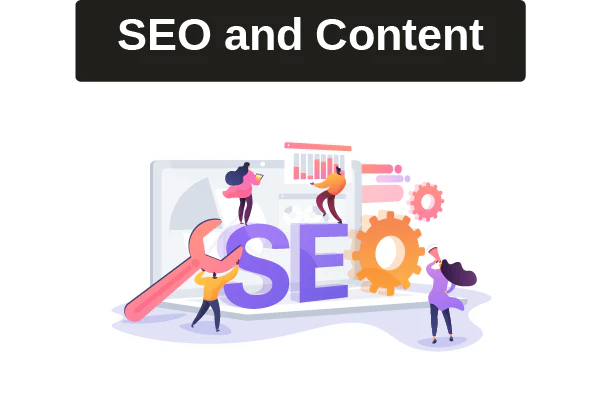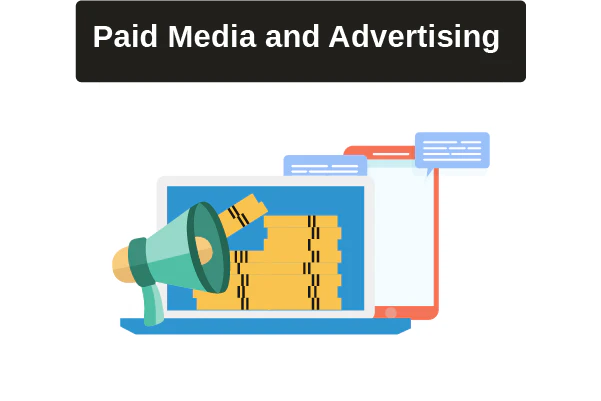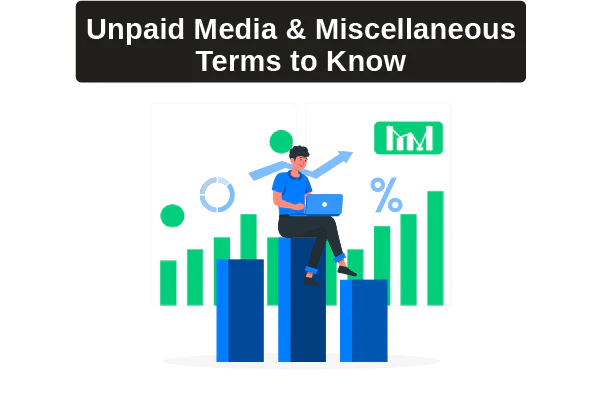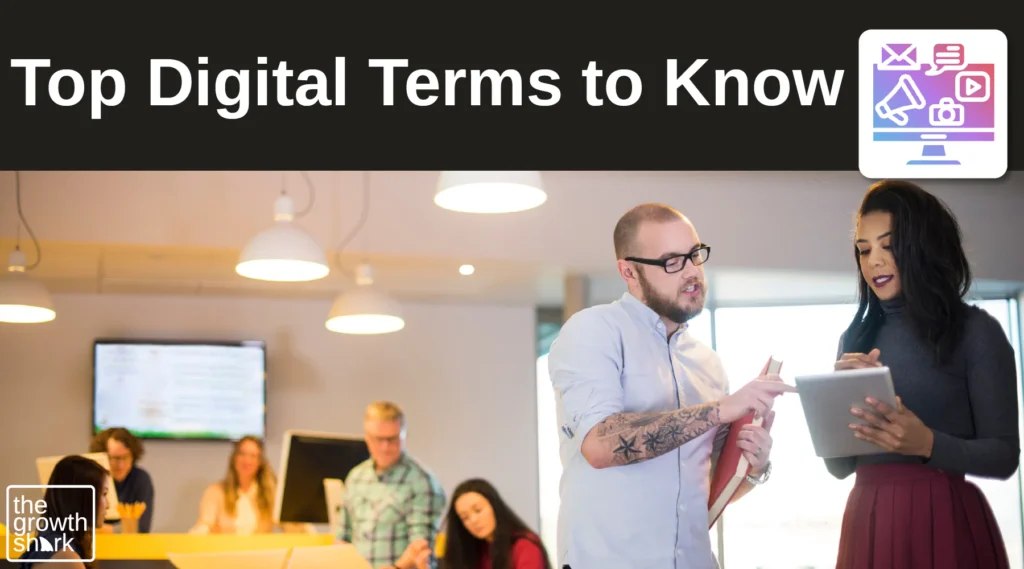Just like any industry or field of expertise, digital marketing has its own terminology, jargon, and even slang. We like to use abbreviations, acronyms, and catchy phrases that the average person would never even hear, let alone understand.
As a business owner, you will be required to engage in marketing in some form or fashion. Whether you’re doing it all on your own or you’re working with a professional marketing team like ours, there’s no need to be left in the dark.
That’s why we’ve compiled a list of some of the more common internet marketing terms with a brief explanation of what they mean and how they relate to marketing your business.
SEO and Content

Alternative text is text paired with an image or other type of media and can be used as an alternative to viewing the media directly. This allows visually impaired audience members to hear what the media contains as well as allows the image to be included in search results. This section is a perfect way to include keywords which contribute to search engine results while airing on the side of inclusivity.
Backlink
A backlink is placed in written content. It is a word or group of words hyperlinked to another location. Sites that include backlinks to trusted and well-established websites are typically ranked higher by Google and other search engines.
Call to Action (CTA)
Your CTA is letting your audience know what you want them to do. What action are you trying to persuade them into taking? It should be clearly stated at some point in the content, but your entire content piece should not focus on your CTA.
Content
Content is any relevant, valuable, and engaging piece of information. Content is seen in written, video, or audio form and can appear on a website, social media, video or podcast platform.
Content Creation
Content creation is simply the process of creating content. It typically involves finding a relevant topic you want to focus on, deciding which form of content you want to create, and doing any research necessary to aid you in the creation process.
Content Management System (CMS)
A content management system is a software that helps you create, manage, and edit content on a website without much technical skill or background. It’s basically a tool used to build a website without the need for coding.
Content Marketing
Content marketing is a marketing strategy characterized by creating and sharing content across the web. Examples of content marketing can include blog posts, images, videos, and other forms of media. While it is a form of marketing, it does not have to be “selling” your product or brand to your audience. Your purpose may be to educate or inspire an ideal audience in order to build a brand community.
Infographic
Infographics are representations of information in a graphic format that helps make it more easily understood by its intended audience.
Keyword
Keyword refers to a word or phrase used in content that indicate to users and search engine algorithms what the content is about. Keywords essentially help people find your content. To do this, Google, Instagram, and other search engines will identify keywords from content and tags on a webpage. When someone searches for a keyword, search engines will then scan through their databases to find pages containing and related to your keywords, then list those pages out for you.
Long Tail Keywords
Long tail keywords are simply a phrase rather than a single keyword. While they aren’t searched for as often, these searches are typically more focused and done with intent to complete a task. These keywords are important since they generate a more niched-down audience with the intent to engage.
Meta Descriptions
Meta description is a meta tag within a webpage used to describe the contents of that page using 160 characters or less. This snippet will show up on search engine result pages as well as give your viewers an idea of what they can expect to see on your page.
Search Engine Optimization (SEO)
Search engine optimization is a marketing tool often used to boost search ability and traffic. SEO is a common tool used in things like content creation, increasing brand visibility, and strategy development. SEO is a key pillar of organic marketing strategy.
SEO Metrics
SEO metrics are data points that give you measurable data to help you see how your content is performing in order to help you create new strategies, change current plans, or fine tune your content.
Paid Media and Advertising

Banner Ads
Banner ads are image-based ads displayed on websites. They can be hosted by the website owner or as part of an ad server’s network.
Bounce Rate
Bounce rate is the percentage of visitors that leave a website before interacting on the page or viewing other pages on the site. A high bounce rate lets you know that people aren’t sticking around due to some issue. There could be a whole host of issues causing a high bounce rate, from page loading time to simply the content on the page.
Click Through Rate (CTR)
Click through rate is the ratio of clicks your ad or other marketing piece receives based on the number of times your piece is seen. In terms of ads, a higher CTR means a higher ad quality score.
Conversion
Conversion refers to any desirable action taken by a user as a result of marketing efforts. It is relevant to any marketing platform or medium, and it’s the main goal of marketing.
Conversion Rate (CVR)
Conversion rate refers to the percentage of conversions generated or goals completed compared to the total number of potential conversions available. For example, if 1,000 people visit your site and 100 converted on a goal, then your conversion rate is 10% because 1,000 people could have converted but only 100 people did convert.
Cost Per Acquisition (CPA)
Cost per acquisition is pretty self explanatory – it’s the financial cost required to reach a desired goal. It typically applies to acquiring conversions (leads or sales) and is commonly used to determine ROI.
Cost Per Click (CPC)
Cost per click is the amount you pay each time one of your ads is clicked.
Dynamic Ads
Dynamic ads are ads that dynamically adapt to a customer’s specific circumstances.
Email Marketing
Email marketing consists of using email content to reach your audience for a specific purpose. It can be used to share content and build product or brand awareness, or it can be used to directly ask for a sale.
Landing Page
Landing page refers to a webpage dedicated solely to moving a viewer forward in the sales process. The next step is often either converting the page visitor into a lead or sale. Depending on the extent your marketing strategy, a sales funnel could have one or multiple landing pages.
Lead
Lead refers to a potential customer in your sales funnel. This customer has in some way shown their interest in your product or brand and at least minor intent to purchase.
Paid Search
Paid search includes any ad you pay to run on search platforms like Google.
Paid Social
Paid social includes any ad you pay to run on social media platforms such as Facebook, Instagram, Pinterest, LinkedIn, and others.
Qualified Lead
Qualified lead refers to a potential customer that has shown enough intent to purchase, often meets certain qualifications which indicate their fit as a customer, and is ready to be passed along to the sales team within a company.
Sales Funnel
Sales funnel refers to a general model that shows the ideal customer journey, all the way from their initial awareness of a product or brand down to the purchase.
Text Ads
Text ads contain words rather than pictures, video, or audio.
Unpaid Media & Miscellaneous Terms to Know

Analytics
Analytics refers to the the data tracked and compiled in relation to a website, platform, advertising or other marketing campaign. This data is analyzed and evaluated to gauge progress and results on any given goal.
Brand
Brand is a fairly intangible concept that refers to a product, service, or company that is unique from other products, services, or companies in a way that makes it clearly distinguishable in the marketplace. It essence, a brand is the factor that makes it stand out from similar options in the marketplace. Brand helps people identify a company. Think Nike, Hulu, Disney, etc. You recognize these brands and can easily distinguish their products and services from their competitors.
Brand Awareness
Brand awareness refers to the extent of consumer awareness of a brand and its products or services. Brand awareness can be linked to conversion rates, making it important to prioritize.
Brand Community
Brand community is a community of customers whose interest and investment in a brand goes deeper than the item being sold. This group of customers desire to be and often identify as being a part of the brand. They have an emotional connection to a brand. Brand communities often have a place where they can connect with each other over common interests regarding the brand.
Business to Business (B2B)
Business to business refers to sales and services between one business and another. B2B marketing is any marketing effort aimed at helping one business earn the sale from another business.
Business to Consumer (B2C)
Business to consumer refers to sales and services from a business to the customer. B2C marketing is any marketing effort aimed at helping a business earn the sale from a customer.
Buyer Persona
Buyer persona is the imaginary buyer a company may create as the absolute ideal client in order to strategize their marketing efforts around and toward it.
Campaign
Campaign refers to an advertising, email, social media, SEO, or any other clearly defined marketing plan used to help a business get found, promote a product, or achieve some other marketing goal.
Customer Journey
Customer journey is the course of interaction and the experience a customer has between discovering your brand or product and becoming your customer.
Digital Marketing Plan
Digital marketing plan refers to the strategy and plan a company will use to promote, advertise and sell things online including their brand itself, their content, products, or services.
Engagement Rate
Engagement rate refers to the percent of followers or people who engage with a post in some way out of the total number of people who saw it. Among the various platforms, this could be counted as likes, comments, shares, downloads, or saves.
Inbound Marketing
Inbound marketing is a marketing model focused mainly on attracting customers to a product or brand, typically by producing content that will draw a specific group of customers into your website and social media.
Key Performance Indicator (KPI)
Key performance indicator is a measure of performance over time for a specific goal set by the company. This often gives the team an overarching goal to work for in their specific sector.
Lead Magnet
Lead magnet refers to a free item or service that a company may give away for the sole purpose of collecting customer information.
Omnichannel Marketing
Omnichannel marketing is a multichannel marketing approach to promote a brand, product, or service.
Organic Search Traffic
Organic search traffic refers to search traffic coming from a non-paid source. Organic SEO and social media platforms are the main leaders responsible for organic traffic.
Outbound Marketing
Outbound marketing is a marketing model focused mainly on outbound marketing efforts of a company or team. This includes paid advertising campaigns, public relations, promotions, and even unsolicited calls. For this reason, it is often called interruption marketing.
Public Relations (PR)
Public relations refers to the image of a company or individual to the public.
Social Media Strategy
Social media strategy refers to the plan of how the company will utilize social media platforms to support the company’s overarching goals.
Testimonial
Testimonial refers to a positive review from a customer regarding the product, business, or brand and is often used within marketing and advertising materials.
Unique Selling Proposition (USP)
The unique selling proposition is the one thing that makes your brand, product, or service different from the competition.
User Experience (UX)
User Experience encompasses all interactions a customer has with your site.
More Marketing Terms to Come
That’s a lot to take in! And that doesn’t even cover all the most common marketing terms used today.
Check back frequently, as we’ll regularly add more terms to this digital marketing glossary.
Any questions or still confused by a term? Reach out to us today, we’re here to help you navigate and conquer the world of digital marketing.
And if your head is swimming and you’d rather hire a marketing team versus doing it all yourself, be sure to read “How to Hire the Right Marketing Agency for Your Brand.”









